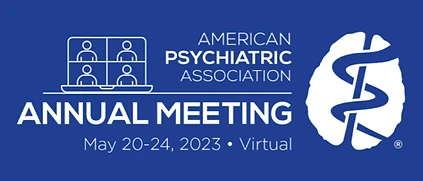BREAKING NEWS!
Food Addiction Panel Discussion at APA. 2023 Annual Meeting, San Francisco.
Tuesday, May 23 8:00-9:30 AM at Moscone South, Third Level, Room 303
Food Addiction: A New Substance Use Disorder?

Speakers:
Chair: Ashley N. Gearhardt, Ph.D.
Presenters: George F. Koob, Ph.D. & Gene-Jack Wang, M.D.
Discussant: Nora D. Volkow, M.
Description:
The food environment has changed drastically in the last 50 years, with a marked increase in palatable foods that contain unnaturally high levels of refined carbohydrates and added fats (e.g., ice cream, cookies, chips). This shift has been accompanied by stark increases in loss-of-control eating, obesity, and diet-related disease.
There are marked health disparities in these conditions, with under-resourced individuals and communities of color bearing more of the burden. Despite public interest in healthy eating, we have failed to develop long-term solutions to successfully reduce excessive food intake at a population level.
Scientific evidence has been building that the highly reinforcing nature of some types of food can trigger neural and behavioral changes implicated in addiction.
Approximately 14% of adults and 12% of children exhibit clinically significant levels of “food addiction” based on the DSM 5 criteria for substance use disorders.
“Food addiction” is associated with poorer quality of life, worse treatment prognosis, and greater psychopathology. However, “food addiction” is not currently included as a recognized or provisional diagnostic category in the DSM 5.
In our session, we will consider from a biopsychosocial perspective evidence for the validity of “food addiction.” We will review the evidence that excessive food intake is capable of causing neural reward dysfunction.
(Dr. Gene-Jack Wang, a Senior Clinician and Lab Director from NIAAA).
Next, we will consider evidence that excessive palatable food intake can lead to hyperkatifeia through negative reinforcement mechanisms
(Dr. George F. Koob, the Director of NIAAA).
Finally, we will discuss the assessment and clinical relevance of “food addiction” in humans, including the development of personalized treatment approaches and the role of addiction pharmacology.
We will also consider the contribution of potentially addictive foods to health disparities
(Dr. Ashley N. Gearhardt, an Associate Professor of Psychology from the University of Michigan and author of the Yale Food Addiction Scale).
We will integrate straw polling into our session to assess audience opinions on the validity of the “food addiction” construct and include an interactive panel discussion on the state of the “food addiction” science.
We will finish our panel with a Q&A session with the audience.
Learning Objectives:
- Identify addictive eating in patients using empirically supported assessment tools
- Incorporate the role of reward dysfunction and hyperkatifeia into conceptualizations of excessive overeating
- Evaluate the scientific basis for the inclusion of food addiction as a new diagnostic category
- Formulate individualized treatment plans for excessive overeating that target addictive mechanisms
- Consider the role of addictive foods as a contributor to health disparities